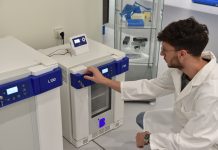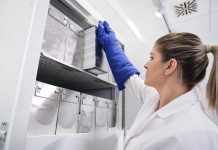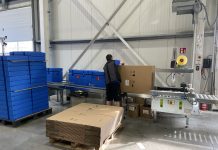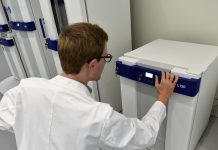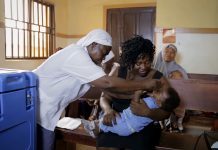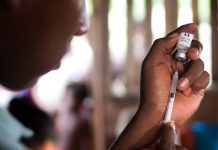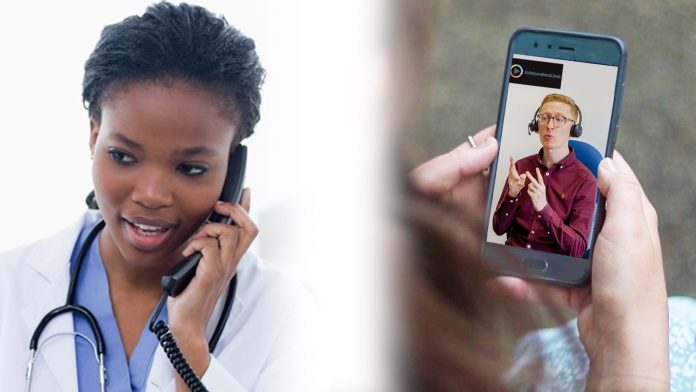
Making sure Deaf people are heard and providing inclusive patient healthcare worldwide.
Many Deaf people around the world face inequalities when accessing healthcare services or information – from visiting their GP or having a scan during pregnancy, to seeking support with their mental health.
They are more likely to suffer ill health than other people, simply because it is harder for them to use the health services that many of us take for granted, and because they are twice as likely to have high blood pressure, four times more likely to develop diabetes, and generally have a reduced life expectancy.[1]
We should all be able to talk to our doctors and nurses, and for them to talk to us, but many studies report Deaf patients encounter severe communication barriers when accessing health services.
The evidence
Worryingly, a recent NHS report in the UK showed 44% of Deaf patients found the last contact with their GP or health centre to be difficult or very difficult, compared with only 17% from a general population patient survey. [2]
Furthermore, the results of a consultation involving 121 Deaf, Deafblind, or hard of hearing residents in the UK showed they faced hardships in accessing many areas of the NHS.
Basic transactions like making a routine appointment proved difficult for many Deaf people who struggled to book appointments unless they physically visited their doctor’s practice. They were also unable to book an emergency appointment as they did not know how to do so.
Currently, Deaf patients are not automatically offered the opportunity to have an interpreter present at their medical appointments, so when they attended, a British Sign Language (BSL) interpreter was often not present, either because the interpreter had not shown up or the healthcare professional had not booked communications support, preferring to rely on notes.
The individuals also faced difficulties in understanding healthcare correspondence, citing problems with the complicated wording of the letter, which often asked for a telephone response. Finally, when they attended for consultation, they said they could only understand ’some’ of the information communicated to them, resulting in a limited understanding of their medical condition.[3]
In another study, many Deaf participants faced issues related to language, and a lack of Deaf awareness when trying to access healthcare services. Providers did not seem to know that BSL is a language unrelated to English – meaning many BSL users who were born Deaf or lost hearing early in life have limited proficiency in English. One interviewee explained that numerous healthcare providers think all Deaf people can read, without realising that a lot of BSL users do not understand English.
Interviewees said they wished healthcare staff were more Deaf aware, as many healthcare providers lacked understanding about Deafness. This affected the doctor-patient relationship, with many interviewees agreeing that doctors “can be a bit patronising at times” and that this patronising attitude made interactions difficult. A lack of Deaf awareness can also lead to Deaf patients feeling forgotten. Many interviewees felt that Deaf people are easily ignored, with one interviewee saying: “I always feel like Deaf people are put last.”[4]
COVID-19 and the Deaf community
2020 saw the healthcare sector in crisis as the world grappled with the global COVID-19 pandemic and, as a result, communication barriers for the Deaf community became even more apparent and problematic.
The initial press conferences and TV adverts delivering vital health information as the crisis took hold had no interpreters present, leaving some Deaf people misunderstanding information.
Furthermore, many of the 12 million people who are Deaf or have hearing loss rely on lip-pattern and facial expression to communicate and, with the use of face coverings made mandatory in most public places to reduce coronavirus spread, many Deaf people were left frustrated, isolated, and unable to communicate properly.
All hospital staff were also required to wear Type 1 or 2 surgical masks at all times, and all hospital visitors and outpatients were expected to wear face coverings, and this significantly exacerbated communication difficulties for Deaf patients, with many stating they struggled to communicate with health and social care professionals during face-to-face consultations and interactions as a result of visual cues being masked by Personal Protective Equipment (PPE).
The latest Office of National Statistics (ONS) report on coronavirus and the social impacts on disabled people in Great Britain: July 2020, showed that 47% of people with a hearing impairment reported that coronavirus impacted their access to healthcare and treatment for non-coronavirus related issues, compared to 16% of non-disabled people.
In addition, the pandemic saw people being encouraged, and choosing to have health and social care appointments and interactions over the telephone, however, for many people with hearing loss, telephone conversations in which visual cues are lost are difficult or impossible.[5]
Access to health services is a right
Under the Human Rights Act in the UK, adequate access to health services is a civil right, meaning health practitioners and staff must establish effective communication with Deaf patients as part of their human rights, however, many are reportedly unaware of Deaf culture and the health needs of Deaf people.
Practitioners often believe that lip reading and note taking provide effective health communication, when in fact they are ineffective methods for healthcare conversations and carry huge risks of misinterpretation and even misdiagnosis.
In a large-scale research about the preferred communication mode of Deaf and hard of hearing people in clinical settings in the UK, 50% of sign language users preferred to communicate via sign language interpreters[6], proving that interpreters are essential for patients to receive the best care.
Clearly, healthcare services need to do more to enable equality and accessibility for Deaf people, and there are a number of ways in which access to healthcare services could be improved.
Knowing legal obligations
The Accessible Information Standard (AIS) was introduced by the government in 2016 to ensure people with a disability or sensory loss are given information in a way they can understand, and it is important that medical professionals keep this legislation front of mind.
If implemented effectively, it brings several benefits, including improved outcomes, heightened experiences and the provision of safer and more personalised care and services for patients. Medical staff should be aware that they are legally obliged to comply with the AIS in order to identify and meet the information and communication support needs of patients and must act accordingly.
Understanding Deaf patients’ requirements
Understanding and acknowledging Deaf patients’ communication methods is vital. If clinicians fail to communicate appropriately and effectively, they could risk misdiagnosing their patient or, even worse, prescribing the wrong medication. There are various means of communication that can be used depending on a patient’s needs and preferences, from BSL and Sign Supported English (SSE) to using the Deafblind manual alphabet or lip-reading. That said, they must be aware of the challenges lip-reading presents (studies show only 30 to 45% of the English language can be understood through lip reading alone [7]), and they should never presume a patient will be able to lipread because he/she is Deaf or hearing impaired.
Taking advantage of technology
With the increase in ‘virtual’ GP and hospital appointments, technology has a key role to play in aiding communication between medical professionals and Deaf people. For healthcare providers, video interpreting systems can enable profoundly Deaf patients to have instant access to a clinician in person or over the phone, through a registered and qualified BSL interpreter. The systems work to remove the communication barriers for Deaf people, by giving them the freedom and independence to communicate with and access services from their healthcare provider, allowing vital information to be communicated simply, easily, and on demand 24/7.
Video interpretation has been commissioned for many years; however, the government has so far been slow to move forward with the implementation despite the clear benefits.
Not only can video help minimise the admin time for clinics it can reduce the costs associated with cancelled face-to-face appointments, which can be rescheduled to take place virtually.
Our video interpretation service, InterpretersLive!, is available for short notice, non-complex emergency requirements and ensures Deaf patients can communicate straight away without delay and from the comfort of their home.
Some patients even prefer to get the advice or treatment they need using this method, as it allows them to join the appointment in more familiar and relaxing surroundings. In most cases, our video interpretation services can be provided and funded by the NHS Trust or Clinical Care Group (CCG).
Where an interpreter is required, healthcare providers must ensure they are of a high standard and that any video consultations are conducted using an appropriate and secure platform. For example, InterpretersLive! delivers real-time access to qualified and registered BSL interpreters and has the flexibility to be delivered via most video communications tools including Starleaf, Attend Anywhere, and Microsoft Teams.
Seeking external support
Whilst taking the above steps can undoubtedly help bring healthcare providers closer to meeting accessibility needs, if in doubt they should seek the advice of an external expert who can offer guidance and services to help them communicate effectively with Deaf patients. This includes interpretation support face-to-face and via video, BSL translations, and Deaf awareness training.
In conclusion
Health needs among Deaf populations globally remain unmet and more must be done to reduce inequalities and ensure Deaf people have equal access to professional health services.
With the right action and support, it is possible for medical professionals to empower the Deaf community and break down the barriers that people with disabilities face. By learning about Deaf culture, understanding the unique communication needs and preferences of Deaf patients and offering BSL interpreters, they can ensure they provide an optimal and inclusive quality of care.
For more information about Sign Solutions’ interpretation services for healthcare organisations visit www.signsolutions.uk.com , call +44(0)121 447 9620 or text +44(0)7816 217228
[1] London.gov.uk, 2015
[2] NHS England, 2015
[3] BID services, 2015
[4] The Conversation, 2019
[5] RNID, 2020
[6] The Journal of Deaf Studies and Deaf Education, Volume 21, Issue 1, January 2016
[7] Huffington Post, 2017


